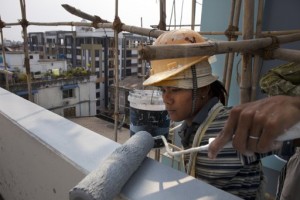UNITED NATIONS — In a world beset by war, ethnic conflict and humanitarian disasters, Burma seems one of those rare places where diplomats can say they are making a positive difference.
Maybe that’s precisely because this Southeast Asian land, was until recently a pariah state, suffering from the self- inflicted wounds of a ruthless military regime, ethnic conflicts, rebuilding from humanitarian crisis, and even a name change from Burma to Myanmar by the country’s military rulers.
After returning from yet another visit to Burma, the UN’s Special Envoy Vijay Nambiar described “Dramatic positive changes in Myanmar”. One year after a new civilian government had been formed, he said, political and economic reforms, as well as the release of political prisoners, were “key components of change.” Still the veteran diplomat cautioned, “Myanmar was only at the beginning of its transition.”

Normally such positive press briefings must be taken with a grain of salt, but it appears we may be on the cusp of Burma’s long awaited move out of its self-imposed isolation and into the light of prosperous Southeast Asia.
From 1962 until 2011 Burma was ruled by a leftist military junta who combined socialism, hyper-nationalism and secrecy to cut this country off from the world. Periodic regime crackdowns on dissidents, the house arrest of the leading human rights Nobel laureate Aung San Suu Kyi, and massive human rights abuses, prompted suffocating sanctions and isolation from the United States and European Union. And very rightly so.
Burma forms the geopolitical nexus of competing regional power interests; bordering China to the north, India to the West, Thailand to the East, and the Bay of Bengal to the south. Historically the country’s country fortunes and fate have sea-sawed between former British India and China. During WWII, the Burma Road proved a vital back-door supply link to embattled Nationalist China. Now there’s a new Chinese connection.
Today the People’s Republic of China remains THE key political, military and economic player in this resource-rich land of 55 million people. Beijing has provided diplomatic cover for the Rangoon rulers by blocking human rights resolutions in the UN Security Council. At the same time Mainland China has been vacuuming up resources from hardwoods, gems, oil and gas and has looked to Myanmar’s southern coast as a maritime outlet to the Indian Ocean.
But the PRC construction of a $3.6 billion dam project on the Irrawaddy River was a step too far; Myanmar’s quasi-civilian government flexed its muscles and put the Myitsone complex on hold. Observers cite Beijing’s “big brother” attitude as much as the new government’s desire to cautiously re-integrate with the West, and break the isolation.
Importantly Burma’s new government, ruling from the glitzy and gaudy inland capital of Naypyidaw have been courting the West as well as Japan. In December U.S. Secretary of State Hillary Clinton made an politically significant visit to meet Ms. Suu Kyi leader of the opposition National League for Democracy (NLD) as well as officially greet the new civilian rulers. She was the highest ranking American official in Burma since Secretary of State John Foster Dulles in 1955.
Japan is talking about resuming development loans and aid; Tokyo was a major donor prior to 2003 when Ms. Suu Kyi was detained. Naturally the Association of Southeast Asian Nations (ASEAN) plays a powerful political/economic role here too.
Yet so much hinges on the April elections for 48 parliamentary seats. The NLD will contest the vote and Ms. Suu Kyi is running for a parliamentary seat.
The UN’s envoy Nambiar realistically stressed the upcoming elections would test the government’s ability to enhance the democratic process. Significantly he called for a lifting of sanctions.
He added that the chances for continued progress meant that “the international community must respond robustly to people’s needs by lifting current restrictions” on the country. “The people of Myanmar will expect the international community to step up,” he asserted. But it’s Myanmar’s grim military leaders who also must show their intentions and step out of the shadows.
“If Burma’s rulers really want to end their country’s disastrous isolation, they will have to begin by proving they can be trusted at their word. This will mean going beyond the current charm offensive and taking measures to rein in elements of the military that still regard themselves as laws onto themselves,” stated the pro-democracy website Irrawaddy.org.
While Western countries such as Britain and the USA will offer strong symbolic support in bringing Burma back from the edge, by easing or lifting economic sanctions, as importantly, the regional ASEAN states are poised to play the most vital long-term role in easing Burma out of its isolation.
John J. Metzler is a U.N. correspondent covering diplomatic and defense issues. He writes weekly for WorldTribune.com.


You must be logged in to post a comment Login